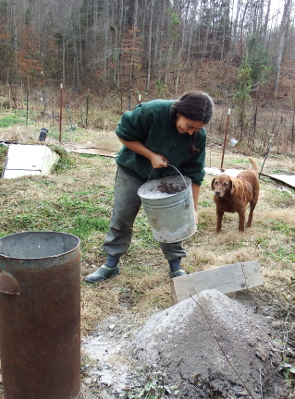
Using charcoal and wood ashes in the garden
 "Both charcoal and ash are important soil amendments on my homestead. I
was surprised to see your ash just dumped on the ground. I store mine
out of the rain until I need to use it. Just this past week I spread
three trashcanfuls on the back pasture and still need another 1/2 can
full to finish the job. As for the charcoal, I soak it in urine prior to
adding it to the compost. What do you do with yours?" ---
"Both charcoal and ash are important soil amendments on my homestead. I
was surprised to see your ash just dumped on the ground. I store mine
out of the rain until I need to use it. Just this past week I spread
three trashcanfuls on the back pasture and still need another 1/2 can
full to finish the job. As for the charcoal, I soak it in urine prior to
adding it to the compost. What do you do with yours?" ---
I'll start out with
the ash side of the equation. Wood ashes are a good source of garden
nutrients...for some soil. Unfortunately, they're a bad match with our
ground since wood ashes sweeten your soil and add a hearty dose of
potassium...and our garden soil already veers almost too far toward the alkaline and definitely contains more potassium than it should. We are
planning on raising the pH of some pastures this year, but those areas
are also overabundant in potassium already, so we'll be purchasing lime
instead of applying ashes. In the end, I highly recommend that gardeners
perform a soil test before adding wood ashes to their soil willy-nilly
or you may end up doing more harm than good. (On the other hand, you
might find that your soil is a perfect fit for wood ashes! Either way,
it's good to know.) That explanation (plus the fact that we're not
soapmakers) is the reason why our ashes are simply sitting in a pile of
waste on the ground.
The charcoal, though, we sift out with greedy little fingers to turn into biochar.
Please do read the lunchtime series I've linked to in my previous
sentence for more information, but the short version is that we tried
activating our charcoal with urine just like Su Ba does, and didn't seem much effect. So last year's charcoal went down the composting-toilet hole to create a combination much more like the terra preta
that modern biochar is trying to replicate. I won't be applying that
compost until this coming fall and probably won't have any results for
you until 2016, but that's the direction we're aiming for at the moment.
Stay tuned for more information on biochar...in about eighteen months.
Want more in-depth information? Browse through our books.
Or explore more posts by date or by subject.
About us: Anna Hess and Mark Hamilton spent over a decade living self-sufficiently in the mountains of Virginia before moving north to start over from scratch in the foothills of Ohio. They've experimented with permaculture, no-till gardening, trailersteading, home-based microbusinesses and much more, writing about their adventures in both blogs and books.
Want to be notified when new comments are posted on this page? Click on the RSS button after you add a comment to subscribe to the comment feed, or simply check the box beside "email replies to me" while writing your comment.

I wonder if you might be able to make use of the ashes as a liming agent by leaching the potassium component out. The potassium should be mostly water-soluble (as KOH, K2CO3, etc.), while the calcium (as CaCO3 or CaO) should be mostly insoluble.
Of course, then you'd have a bunch of potassium-loaded water to deal with. Maybe you could rig something up so the rain would filter through, taking the potassium with it and leaving your lime behind. Sounds like a job for your inventor!